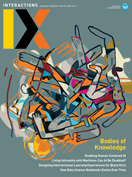Authors:
Ana Ndumu
People need meaning—that is, the essential qualities of a fulfilled life. Our faith systems, artistic pursuits, and recreation are, at their core, meaning-making practices. Still, meaning-making as an information phenomenon remains understated. It seems that hyperconnected technologies, including social media and networked online communities, fall short of uncovering the deep parts of human existence. Widespread tumult is being met with our search for more. We thus find ourselves at a suitable juncture to explore nature/culture, human body/mind, and the research/researcher as catalysts for depth and meaning. Insights → Black women are reclaiming their autonomy and wellness using technology-mediated…
You must be a member of SIGCHI, a subscriber to ACM's Digital Library, or an interactions subscriber to read the full text of this article.
GET ACCESS
Join ACM SIGCHIIn addition to all of the professional benefits of being a SIGCHI member, members get full access to interactions online content and receive the print version of the magazine bimonthly.
Subscribe to the ACM Digital Library
Get access to all interactions content online and the entire archive of ACM publications dating back to 1954. (Please check with your institution to see if it already has a subscription.)
Subscribe to interactions
Get full access to interactions online content and receive the print version of the magazine bimonthly.






